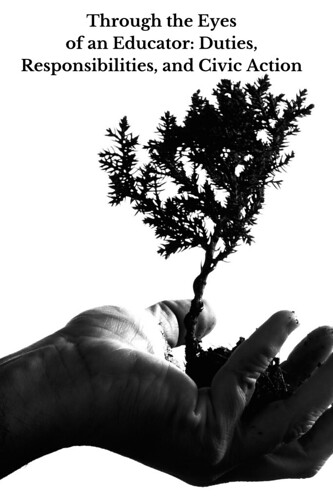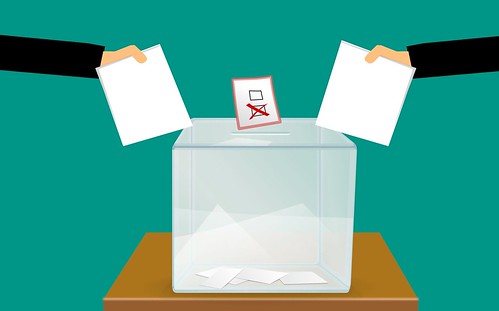Through the Eyes of an Educator: Duties, Responsibilities, and Civic Action
We can all hope we’re lucky to, one day, look back in our rearview mirror and tell stories of life amidst the 2020 pause. It’s November–how are you holding up? Things sure are nutty these days.
It’s imperative that we remember that amidst the chaos there is civic action, amidst the madness there is mindfulness, and amidst the reckoning there is responsibility. It takes work, it takes diligence, it takes courage. Whether we know it or not, we each have all of those in spades. Often it’s difficult to see through the haze of ick, but ‘we the people’ truly does mean that we have the power and it’s up to us to use it well. Sometimes we teach the next generations, and other times we learn from them; that symbiotic relationship is critical to how we view duty, responsibility, and civic action. How each of us choose to use our voice–for change, for good, for justice–matters, and it’s at this time, every four years, that it matters more than ever.

2020 has thrown all of us for a bit of a tailspin. With hugs halted, fear stoked, and seemingly evil empowered, the slinging of muck seems constant and the mire endless. While it may have to be from a safe distance, through our protective masks for a while still, our force for change is fervently powerful.
This year has definitely asked a lot of us all.
For months now, we’ve been tasked to show love without hugs, show kindness amidst corruption, and literally fight for justice against the laws coming out of our own government. When all seems fraught, I remember my 8th grade social studies experience and the students in my 11th grade US History classroom...and do my best to try to conjure those animated singing kids from Schoolhouse Rock! When all seems like an uphill battle, can we aim to channel those words that were so long ago inscribed in the Preamble of the US Constitution? When all seems weighted and heavy, can we remember the strength in the bold intentions of the framers? ‘We the people’ means exactly that–we the people! Each of us has a voice. How we choose to use it is significant. I used to actively remind my high school students that throughout life, and especially at the time of any election, if we don’t use that voice, we have no right to complain. How will you use your voice this November?
Throughout the course of history, there have been plenty of powerhouses. Children study their efforts, documentaries put their actions center stage, and scholars quote their speeches. It’s in the leadership of both giants and ordinary citizens that we find strength, courage, and the ability to use our voices even when the world seems to aim to stifle them.
It’s up to us to ensure that the next generation remembers.
It’s up to us to ensure that the next generation is empowered to speak, act, engage, and fight for justice even when it’s hard, especially when it’s hard. It’s up to us to model behavior of duty, responsibility, and civic action–for united, our force is impenetrable. Children remember what they see, what they hear, and how they are treated. Let’s embrace the charge of ‘we the people’ and act accordingly–our success as humanity and as a nation depends upon it.
How to showcase duty, responsibility, and civic action
Model behavior
Classrooms come in all shapes and sizes. Some have walls, while others do not. Some have facilitators, while others do not. With whom we choose to spend our time, listen to, and share speaks volumes. The world is our classroom, and all with whom we interact, our teachers. Perhaps some show up in our lives to teach us how to act, while others do the exact opposite. From a very early age, young minds are engaged, active, and take in their surroundings. Children notice tone, words, and how they feel. Teenagers see how we show up in the world, if we’re kind, if we embrace compassion, and if we seek to dismantle injustice. Young adults are aware they have voting power, yet understand that acting on that power is not a guarantee for change. Modeling that civic responsibility can be our legacy. Stay informed on the goings on in your local area and world beyond. Talk to your kids and listen to their thoughts, struggles, and questions. Take your kids to vote. An engaged citizenry starts with you. Are you up to taking part in the process?

Encourage conversation and discourse
Educators learn about multiple intelligences. We know that not all students learn in the same way, at the same time, or at the same rate. We know that learning happens with every step, and that listening and questioning is key to growth. We can encourage that growth through conversation and discourse. We can encourage interaction with those whose backgrounds, stories, and opinions are different than our own. We can help young people learn to listen, discuss, debate, share, respect, and grow through sharing ideas. We engage in the free sharing of ideas to learn more, and we can do so respectfully. While there will always be topics on which our tempers flare and passions emblazon, it’s by listening to each other that we reach across aisles and work to create a more just world for all.
Can you promote that message?
Ditch the sidelines–act!
Elie Wiesel fervently reminds us that “what hurts the victim the most is not the cruelty of the oppressor but the silence of the bystander.”
Teach your students to ditch the sidelines.
Millions before us have put their hearts and bodies on the line for our right to vote. How, in good conscience, can we possibly waste that right? Every four years, the people of the United States use their voices to vote for the office of the President. Scrolling through social media can enrage, while talking to people regarding valid, well-researched information on how to vote can unite. Complaining at the dinner table can annoy, while signing up to help canvas or text can empower. Screaming at those whose opinions differ from your own antagonizes, while working to support ideas in which we strongly believe liberates. While casting that vote is paramount to using our voices, ticking a box at the poll is only one of heaps of ways to be involved in the process...how will you take action?

Start ‘em young
Often before they can open their little eyes, children accompany their parents to the polls. Share that power to use your voice for change. No matter their age, children can learn. Perhaps it’s a story highlighting humans who fought for change. Perhaps it’s giving them the option to tell their side of a story and learn to compromise. Perhaps it’s fervently supporting an issue that is close to their heart. Perhaps it’s volunteering for a school committee, helping change a community policy, or even developing a platform and running for office. In many aspects of our lives, we have choices. It’s up to us to ensure our young people remember they, too, have choices–and to work fiercely for those whose choices, rights, or equity is being stampeded by others. Let’s empower our young people to use their voices for change, for good, and for justice. Margaret Mead reminds us to “never doubt that a small group of thoughtful, committed citizens can change the world. Indeed it’s the only thing that ever has.” I believe she’s 100% correct–do you?
Empower activism
While each of us has our own thoughts and opinions on how we see the world, embracing compassion can help to guide our journey. Can we be open to our beliefs of what is right, what is true in the world, while respecting the humans who fervently disagree with us? Can we see each other as conscious humans fiercely supporting a cause they hold dear? In the fight for equality and justice, with the recent deaths of ordinary citizens and some of the most mighty, mindful giants, we’ve recently seen an onslaught of engaged citizens show their activism. Ruth Bader Ginsberg is the first female to ever lie in state in the US Capitol. John Lewis spent decades fighting for justice and change. Solely two examples in the wide world of history, these engaged citizens empower us to use our voices, act, speak up, and get in that all too often ‘necessary trouble.’ Whether your little one uses their fingers to create signs, dons a t-shirt in their stroller, helps put stamps on postcards, reads stories of those who fought for good, listens as you aim to get informed on the issues, understands that justice and equality for all is vital, or watches you roll up your sleeves to campaign for what or who you believe in your heart is a way forward–they’re learning. Perhaps those little eyes will grow up to be a sixteen year old climate activist, a seventeen year old education activist, or an eighteen year old who excitedly rocks up to the polls to cast their very first ballot. Activism is a key to change–and we each hold the power to act. Will you?
Pin for later:

Stacey Ebert, our Educational Travels Editor, is a traveler at heart who met her Australian-born husband while on a trip in New Zealand. Stacey was an extracurricular advisor and taught history in a Long Island public high school for over fifteen years, enjoying both the formal and informal educational practices. After a one year 'round the world honeymoon, travel and its many gifts changed her perspective. She has since left the educational world to focus on writing and travel. She is energetic and enthusiastic about long term travel, finding what makes you happy and making the leap. In her spare time she is an event planner, yogi, dark chocolate lover, and spends as much time as possible with her toes in the sand.
Check out her website at thegiftoftravel.wordpress.com for more of her travel musings.






















